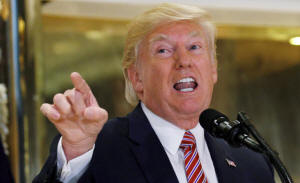|
Trump's stance on Virginia violence
shocks America's allies
 Send a link to a friend
Send a link to a friend
 [August 17, 2017]
By Noah Barkin and Alistair Smout [August 17, 2017]
By Noah Barkin and Alistair Smout
BERLIN/LONDON (Reuters) - America's closest
allies condemned U.S. President Donald Trump in unusually strong and
personal terms on Wednesday after he put part of the blame for violent
clashes in the state of Virginia on those marching against
gun-brandishing neo-Nazis.
British Prime Minister Theresa May, widely criticised at home for
cultivating close ties to Trump during his first half year in office,
spoke out after the president repeated his view that the white
nationalists and counter-protesters were both to blame.
"There's no equivalence, I see no equivalence between those who propound
fascist views and those who oppose them and I think it is important for
all those in positions of responsibility to condemn far-right views
wherever we hear them," May said.
The leader of the centrist Liberal Democrats said May should rescind her
invitation to Trump to pay a state visit to Britain.

"After. @realDonaldTrump whitewash of murder and hatred by
#WhiteSupremacists why is he still on list of invited official guests to
UK?" Vince Cable tweeted.
Politicians in Germany, which has tough laws against hate speech and any
symbols linked to the Nazis who murdered 6 million Jews in the
Holocaust, expressed shock at the images of people in Charlottesville,
Virginia carrying swastikas and chanting anti-Jewish slurs.
Chancellor Angela Merkel condemned the "racist, far-right violence".
Her challenger in next month's election called Trump's comments the
"confused utterances" of a dangerous man.
"We should not tolerate the monstrosities coming out of the president's
mouth," Martin Schulz told the RND newspaper group in an interview.
German Justice Minister Heiko Maas, like Schulz a member of the
centre-left Social Democrats (SPD) which rules in coalition with Merkel,
accused Trump of trivialising anti-Semitism and racism.
[to top of second column] |

President Donald Trump answers questions about his response to the
violence, injuries and deaths at the "Unite the Right" rally in
Charlottesville as he talks to the media in the lobby of Trump Tower
in Manhattan, New York, U.S., August 15, 2017. REUTERS/Kevin
Lamarque

His Israeli counterpart, Ayelet Shaked, a member of the
ultranationalist Jewish Home party in Prime Minister Benjamin
Netanyahu's government, tweeted: "The neo-Nazis in the United States
should be prosecuted. This was not what the American constitution
was meant for."
In a heated news conference on Tuesday, Trump said there was "blame
on both sides" for the violence, which culminated in the death of a
32-year-old woman, Heather Heyer, after a car crashed into
anti-racist demonstrators. A 20-year-old Ohio man said to have
harboured Nazi sympathies has been charged with her murder.
Trump's remarks were praised by white supremacists like David Duke,
a former leader of the Ku Klux Klan, who applauded the president's
"honesty and courage".
But in Europe, even far-right parties that have welcomed Trump's
nationalist message, were critical of his stance.
"These were white supremacists and racists. They need to be
condemned in very clear terms," said Florian Philippot, vice
president of France's National Front and the manager of Marine Le
Pen's campaign for the French presidency.
(This story has been refiled to delete typo in paragraph seven)
(Additional reporting by Andrea Shalal and Michael Nienaber in
Berlin, Jeffrey Heller in Jerusalem, Richard Lough in Paris, Kirsti
Knolle in Vienna, Robert Muller in Prague, Gwladys Fouche in Oslo;
Editing by Robin Pomeroy)
[© 2017 Thomson Reuters. All rights
reserved.]
Copyright 2017 Reuters. All rights reserved. This material may not be published,
broadcast, rewritten or redistributed.

 |